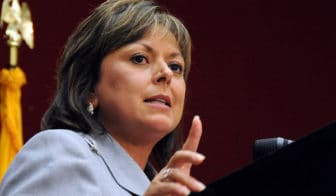Gov. Susana Martinez signed three bills Tuesday to balance the state’s budget, taking about $46 million from the reserves of public schools. But she vetoed cuts to an economic development program and various accounts in New Mexico government.

Heath Haussamen / NMPolitics.net
Gov. Susana Martinez
The bills could raise $190 million for the state’s general fund, closing a deficit that was projected to total about $80 million. The measures also will replenish government reserves, though not nearly to the extent of plans proposed in early January by legislative staff and the governor’s own administration. The package will leave the state’s cash reserves at 1.8 percent, rather than nearly 3 percent as previously proposed.
Martinez said in a statement the package isn’t perfect, but she maintained that “it doesn’t compromise our principles.”
Republicans in the state House of Representatives cheered the governor’s decision to veto pieces of the solvency package that they had opposed.
“We’re pleased that Gov. Martinez line-item vetoed many of the cuts we fought against on the House floor,” Minority Leader Nate Gentry, R-Albuquerque, said in a statement.
Leading Democrats called Martinez’s decisions shortsighted.
“These line-item vetoes from the governor have put us right back where we started — on shaky economic ground,” said Rep. Patty Lundstrom, D-Gallup, who chairs the House Appropriations and Finance Committee.
Sen. John Arthur Smith, D-Deming, said the governor’s action means the state needs new revenues to responsibly address the fiscal crisis. Smith challenged Martinez’s steadfast opposition to raising taxes.
The governor accepted as written a bill to take $46 million from the cash reserves of school districts and charter schools.
Each district is required to keep a portion of its budget in cash, and administrators say they rely on the money to provide a cushion in case of shortages and to cover some expenses while awaiting funding from state and federal governments.
In her own budget plan, Martinez had called the school reserves “slush funds” and proposed to take $120 million from districts.
The Senate and House of Representatives eventually agreed on taking $46 million, exempting districts and charter schools with less than 3 percent of their budgets in cash. That compromise was intended to save schools with smaller reserves or no cash at all from sliding into insolvency.
But legislators say many schools will feel a budget squeeze.
“This definitely will impact the classroom,” said Smith, chairman of the Senate Finance Committee.
Santa Fe Public Schools, for example, will lose $1.9 million in cash reserves. Española Public Schools will lose nearly $600,000 and Los Alamos Public Schools almost $529,000.
The governor said school districts can afford the cuts.
“While a 2 percent cut may pose a challenge, our districts have the means,” she wrote in a bill message, referring to the Albuquerque Public Schools, which is to lose about $12 million of $42 million in reserves.
The governor vetoed about $26 million in reductions that were part of another bill, including $4 million that was to be cut from the Local Economic Development Act, money for local governments to build infrastructure they say is needed to attract businesses. Critics such as the free-market Rio Grande Foundation have derided the fund as corporate welfare. And while the account still would have held more than $20 million, Martinez wrote in a veto message that “sweeping the funds directly hinders job creation and economic growth.”
And she struck down proposals to take cash from various accounts across state government that she said would end important programs or interfere with the state’s obligations to pay court settlements.
Moreover, Martinez vetoed a section that would have required her administration to cut its budget by an additional 1 percent if the state’s reserves fell under 2 percent. That veto by Martinez blocked $60 million in spending cuts.
The governor also signed a third bill taking revenue from insurance taxes usually distributed to fire departments at the end of each fiscal year. These departments still will be paid periodically throughout the year as revenue is collected. But fire chiefs have objected, arguing that the annual payments were key in providing stability for their budgets. Legislative staffers say the change merely modernizes accounting practices.
By signing the bills, Martinez allows lawmakers to move on with a session that began under the cloud of the budget crisis. Legislators moved at an unusually swift clip to approve a package of bills that would close a projected deficit and replenish reserves depleted through previous attempts at balancing the state’s books.
While the Senate approved most measures with overwhelming support from Republicans and Democrats, partisan battles erupted in the House. House Republicans accused Democrats of forsaking schools and fire departments but protecting pork-barrel projects. Democrats, meanwhile, were quick to point out that the state slid into its latest budget crisis when the GOP controlled the House and as a Republican sat in the Governor’s Office, refusing to freeze the implementation of corporate tax cuts.
Lawmakers still have to approve a budget for the fiscal year that begins in July. Though the state is expected to take in less revenue than it has this fiscal year, there are indications that New Mexico’s budget situation may not be so dire. Tax receipts are increasing and the oil industry in the Permian Basin is recovering.
Contact Andrew Oxford at (505) 986-3093 or aoxford@sfnewmexican.com. Follow him on Twitter @andrewboxford. A prior version of this article incorrectly stated that Gov. Susana Martinez also vetoed $8 million in funding cuts to the Public Education Department passed by the Legislature. Martinez didn’t veto those cuts.
